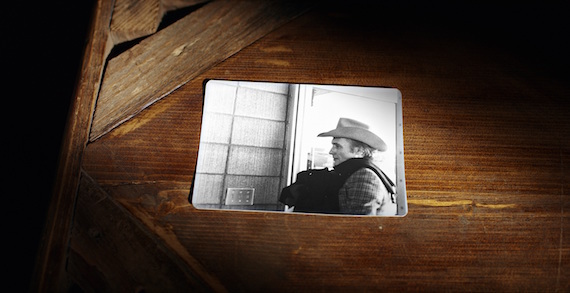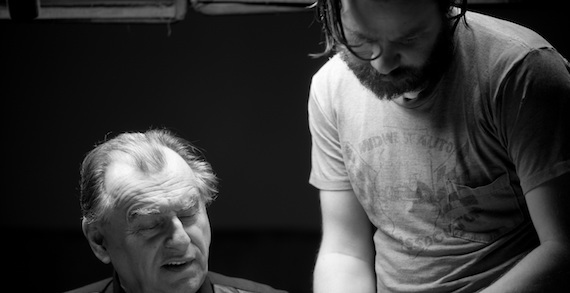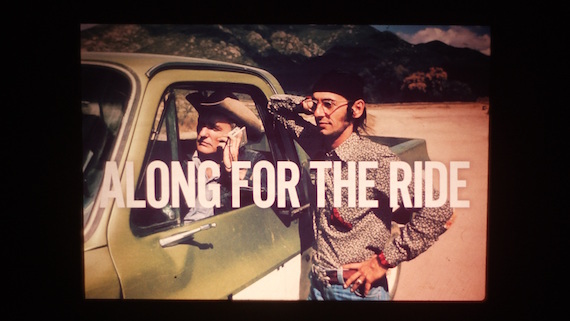Perhaps it is because I once met him at a party with my father in Los Angeles, or maybe it's due to his acting in cult mega classics like Easy Rider and later, Blue Velvet, but Dennis Hopper to me has always represented America. The great United States of America that I dreamed about as a young child and later, as a teenager moved to, anticipating something unimaginable which turned into something bigger and better that even I could have ever dreamt about.
Dennis Hopper is one of the last bastions of greatness that being American has represented, because he gave a s**t. About his country, humanity and art. And in the process, he nearly gave up his career and denied the world of his talents.
In a beautiful, powerful homage to the great icon of the '60s, '70s and beyond, filmmaker Nick Ebeling pairs up with Satya de la Manitou, Hopper's longtime assistant and life best friend, to tell the tale of the actor-slash-writer-slash-filmmaker-slash-artist. In particular the story around the filming of The Last Film, a passion project that nearly cost Hopper everything. The result is a wonderful documentary, titled Along for the Ride, full of insight, passion, love, wonder and stories of a friendship that define an era which could arguably have been the last great hurrah of true courage and revolt for America.
I relished watching Along for the Ride, maybe because to me Hopper has always represented the great American spirit. More than say Clark Gable or Gregory Peck, he's a star I grew up watching, along with my parents, who probably shouldn't have shown a young impressionable girl such grown up films. But they did, and the result is here before you, someone who believes deeply in the power of cinema to help us heal and to bring us to discover the world beyond.
At the premiere of Along for the Ride at the Venice International Film Festival, filmmaker Ebeling, de la Manitou and their producer Sheri Timmons welcomed me with generosity, offering not only a great talk filled with inspiration, but a chance to wear Dennis Hopper's poncho, which was a dream come true.
Following are a few highlights from that pleasant mid-morning talk, a moment of magic spent in the company of some true blue, American history-makers.
This is a film that to me, represents American heritage. What does it represent to you, emotionally?
Nick Ebeling: This is interesting because that's how we connected to each other [with Satya]. I found The Last Movie as a teenager. It was a very hard movie to find and I finally managed to get a VHS copy. I was a fan of Dennis Hopper as so many film school students, so many people are, for so many different reasons. I found this film and Dennis as a filmmaker just blew my mind with what he was doing at that time. The movie was so unbelievably cool and it took so many chances. And it got me to think in a completely different way, about how I constructed things and put them together. I could never get any of my friends to watch, I could never get anyone else to talk about it, I could find very little written about it, just glimpses.
And then I connected with Satya and we started talking about Dennis and I asked him, what about The Last Movie. And Satya was like "you know about that movie? How do you know about that movie?" And ultimately I wound up meeting the guy who loved the film more than me, probably. Whose life was changed infinitely by this film and I could really connect with that idea. There are so many things about Dennis, but usually, historically it goes like this: Dennis Hopper made Easy Rider, the biggest movie in Hollywood, opened up a whole new system... And then nothing until Blue Velvet! So what happened, what does it mean when you take that fight against the studios for what you believe in... It's an incredible story.
To me Hopper has always represented the quintessential American icon. He's like the modern-day John Wayne, trading his horse for a bike. What did he represent to you?
Satya de la Manitou: He was ahead of the curve. Dennis always was a seer in art, culture, fashion, media, you name it. And that's one of the reasons I connected with Nick was that he recognized the fact that the most obscure bit of creativity coming from Dennis, that was The Last Movie, was to him the most important artistic achievement of his life. It is, there is no doubt, but people don't realize this.
I have to admit, I'd never heard of The Last Movie.
De la Manitou: The studios did a good job of putting a complete botch on the film.
Ebeling: In 1971 when you'd mouth off to the most powerful man in Hollywood, at that time your career was over. There was no Netflix...
De la Manitou: No Home Box Office as an alternative. So Dennis took a big chance with this. But that's the way he lived his life. He never went the easy way. He was an edgy person, The Razor's Edge -- all or nothing. (he sings)
That's what makes him quintessentially American. We forget that in these weird days. Wanting to close borders, lift walls, but what America really stands for is someone like Dennis Hopper -- who breaks the rules, stands up for what he what believes in. That's what attracted me to the US, as a little girl. This aura of possibilities.
De la Manitou: Oh, listen, he came from the hard land. The ability to change, Dennis was very chameleon like, in that he could adapt to whatever situation he was in. He was at home with peasants or kings.
Ebeling: And if you notice in the film, the 31 great friends that participated ran all across the gamut.
De la Manitou: And we could have had 231 personages that wanted to honor Dennis. We had dozens of people that wanted to participate. It was very difficult to make a film this length...
Ebeling: We shot probably as much as they shot The Last Movie. They shot 80 hours, we probably shot 81.
There is a quote by E.M. Forster I am definitely overusing these days, "A humanist has four leading characteristics -- curiosity, a free mind, belief in good taste, and belief in the human race." By that definition, Dennis Hopper was a humanist.
De la Manitou: Absolutely, I couldn't put it better.
Do you think cinema can help us to understand the world?
De la Manitou: It should. As long as these tent-pole movies don't take over. The only movies we export are superhero movies based on comic books. Films with violence.
Are we changing the world that way?
De la Manitou: It's possible. It's hard to denigrate the industry you live in. And are part of, we are both a part of it.
Ebeling: Let me interrupt a moment, this is interesting. The Last Movie, part of the reason I really connected with the film is that it's so far ahead, the film talks about globalization, it talks about Hollywood's responsibility to the rest of the world and what its impact is, and that was written in 1965. It's still very much true today.
But that's why we keep revisiting the Sixties.
Ebeling: Because they were right!
De la Manitou: Look, you have to work for peace, and that's not only what I say, it's reality. If you're not at peace with yourself, it's hard to export peace.
Do you think actors and filmmakers should be the next politicians, or at least diplomats?
Ebeling: If they walked it like Dennis Hopper did, yes, but there aren't a lot of those.
De la Manitou: Thomas Jefferson said that democracy cannot thrive without an informed citizen. And I really believe in Jefferson, he wrote the Bill of Rights which is the basis of our freedom in America. First of all you have to vote. But you cannot vote if you don't know what the issues are! You've got to be informed.
The day after the Brexit vote, the most Googled thing in the UK was "What is the EU". Can you imagine?
De la Manitou: How sad.
Ebeling: Dennis and Marlon went to Selma, did you know that?
De la Manitou: Oh yeah, Dennis needed a cheap meal and in Hollywood in the '60s he would go over to Barney's Beanery where he could get a cheap bowl of chili. And he ran into Marlon Brando, another unemployed actor. So Marlon said, "what are you doing kid?" And Dennis said, "I'm looking for a job." And Marlon said to Dennis, "we should be with Dr. King right now, he's going to march on Selma, Alabama." So Dennis said "I'll go with you but I have to go home and get my camera." Dennis' nickname around the sets was "the Tourist" cause he always had his Nikon F hanging around his neck and he took photos constantly, in black and white.
Ebeling: That's why we did the film in black and white, because of his photography, and there are a lot of homages in the film about those photos. We had a lot of pictures we loved and found inspiration from.
De la Manitou: That's another reason we made the movie, to bring out the fact that Dennis Hopper was a civil rights activist, he was a painter, he was a sculptor, he did so many other things besides being a really fine actor. And he directed 8 films. He got nominated for the Academy Awards as one of the writers of Easy Rider which he always maintained he was the only writer. And I know that's true. Dennis was a giant.
Ebeling: It's rare in Hollywood to find any kind of friendship, but these two guys, Satya and Dennis, they were unbelievably great friends.
De la Manitou: And if you can have five friends in your life, you can count them on one hand, you are a fortunate human being.
If you needed to describe each other to someone who's never met you, how would you do it?
Ebeling: Satya is a hero to me. I'd never heard of him before I met him and I think that was purposeful on his part. He never really wanted to be acknowledged. What he believed, how he backed Dennis and where he went to, the ends of the earth for him, is just completely inspiring to me. I was really jaded at that time and meeting him woke me up again.
De la Manitou: Nick is a visionary. Absolutely. I had never met anybody who was so focused on art and exposing others to art. To me that's one of the most important things, that is incumbent upon all of us, to make sure everyone is exposed to the great things that humanity has to offer, that culture has to offer. And Nick is smart enough to be able to know how to do that. We share a common bond in recognizing the worthiness of humanity, and the ultimate victory of good over evil. I really believe in that.
Ebeling: Sometimes we joke that we have a father-son relationship... But I'm the dad.
All images courtesy of La Biennale, used with permission.



